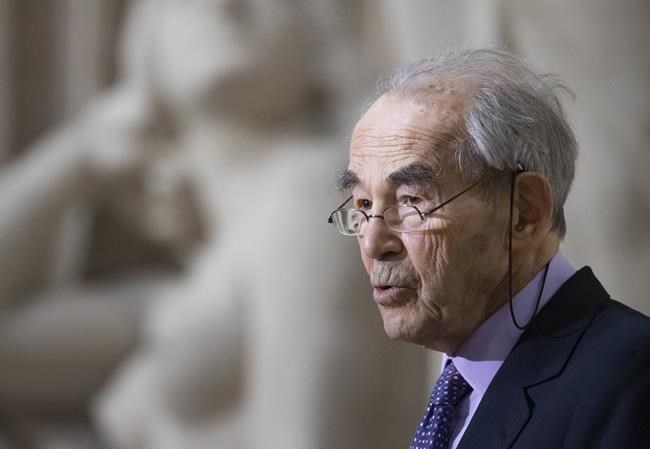
FILE - Former French Justice Minister Robert Badinter, author of the abolitionist law in France, delivers a speech during a ceremony marking the 40th anniversary of the abolition of the death penalty in France, at the Pantheon in Paris, Saturday, Oct. 9, 2021. Robert Badinter, who led the campaign to abolish France's death penalty in the 1980s, has died at age 95. French President Emmanuel Macron hailed Badinter, a former justice minister and revered human rights defender, as a ''figure of the century'' who ''never ceased to plead for the ideas of the Enlightenment.''(Ian Langsdon /Pool Photo via AP, File)
February 09, 2024 - 11:00 AM
PARIS (AP) — Robert Badinter, who spearheaded the drive to abolish France’s death penalty, campaigned against antisemitism and Holocaust denial, and led a European body dealing with the legal fallout of Yugoslavia's breakup, has died. He was 95.
French President Emmanuel Macron hailed Badinter, a revered human rights defender and former justice minister, as a ‘’figure of the century’’ who ‘’never ceased to advocate for the ideas of the Enlightenment.’’ The French Justice Ministry on Friday confirmed Badinter’s death, without providing details.
A famed lawyer and thinker, Badinter was best known for his sustained push to end capital punishment. He described seeing one of his own clients lose his head to a guillotine, used up until the 1970s to kill criminals in France.
As justice minister under then-President Francois Mitterrand, Badinter overcame public opposition and won parliamentary support for abolishing the death penalty in 1981.
Born in Paris in 1928 to a Jewish family, Badinter saw Nazi horrors and France’s collaboration up close during World War II, and lost his father in the Sobibor death camp, according to Macron’s office. As a lawyer, he later pursued a notorious Holocaust denier in court.
Badinter went on to lead France’s Constitutional Court, served as a senator for 16 years, and was seen as a moral compass for many in France for his defense of human rights.
In 1991, Badinter led an arbitration body set up by the European Economic Community to provide the Peace Conference on Yugoslavia with legal advice after two of the country’s six republics – Slovenia and Croatia – had declared independence. The Badinter Commission, as the body became known, was made up of presidents of constitutional courts of the member nations of the EEC, precursor to the EU.
The Badinter Commission issued 15 legal opinions between 1991 and 1993, including one saying that the Socialist Federal Republic of Yugoslavia had dissolved. That paved the way for international recognition of Slovenia and Croatia as sovereign countries in 1992.
The Badinter Commission also declared the borders between former Yugoslav republics as international frontiers between newly independent countries that could only be changed through diplomacy, and not by force. Despite the legal pronouncements, wars raged in the 1990s in Croatia and later Bosnia and Herzegovina and Kosovo, claiming hundreds of thousands of lives and displacing the largest number of refugees in Europe since World War II.
Macron will preside over a special national homage to Badinter, the president’s office said.
In his statement, Macron honored the memory of a ‘’wise man of the republic,’’ who, ‘’after having experienced the tragedy of the century, embodied the most beautiful part of hope.’’
___
Barbara Surk in Nice, France, contributed.
News from © The Associated Press, 2024